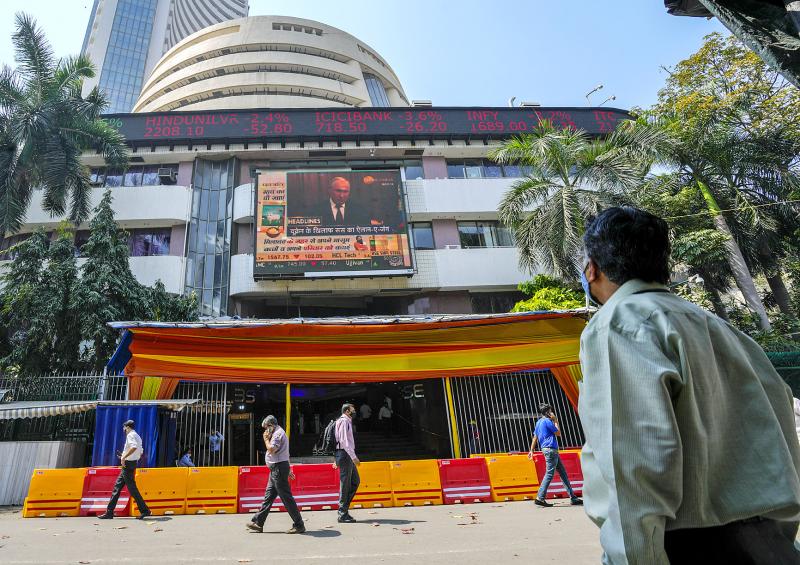Equity futures and global stocks tumbled yesterday, while bonds and oil soared as Russian President Vladimir Putin’s decision to order a military attack on Ukraine cast a pall over global markets.
S&P 500 and NASDAQ 100 contracts slid about 2.5 and 3 percent respectively, signaling the latter, tech-heavy gauge might end up in a bear market. European futures shed more than 4.5 percent and an Asia-Pacific equity gauge fell to the lowest since 2020. Shares slumped in Moscow after a trading suspension was lifted.
In Asia trading, shares in Hong Kong, Singapore, Sydney and Wellington lost at least 3 percent, while Taipei, Manila, Mumbai and Seoul fell more than 2 percent. There were also steep losses in Bangkok, Jakarta, Shanghai and Tokyo.

Photo: AP
Crude and European natural gas surged on possible risks to Russian energy exports, with Brent oil scaling US$100 per barrel for the first time since 2014. The flight to safety saw the US 10-year Treasury yield fall below 1.9 percent. Gold reached the highest level since early last year.
“It is hard to find any reasons for the sell-off to reverse now that it appears the tanks are rolling,” Oanda Corp analyst Jeffrey Halley said.
“Stronger sanctions are to come on Russia and energy prices will inevitably head higher in the short term,” he added.
The US dollar and yen rose, while the euro and commodity-linked currencies retreated. The ruble hit a record low versus the greenback in interbank trade and the Bank of Russia said it would conduct foreign-exchange interventions.
The cost of everything from oil to grains to metals rose on worries that raw-material flows would be disrupted by the unfolding crisis. Ukraine is a major grain exporter and sanctions could isolate Russia, a commodity powerhouse.
That backdrop heralds fresh challenges for a global recovery that was already struggling with elevated price pressures and tightening monetary policy.
“Basically, there’s no scenario priced into the markets because it’s impossible to discount fully,” IG Markets Ltd analyst Kyle Rodda said. “This is always the worst set of circumstances. Bad news is one thing. Bad news with practically unknown outcomes is another.”
The escalation by Russia “will spur further risk-off moves into safe-haven assets, considering that the situation will remain volatile with retaliation measures coming from Western powers,” IG Asia Pte strategist Yeap Jun Rong said.
In cryptocurrencies, bitcoin slid to less than US$35,000 amid risk aversion. The second-largest token ether also had heavy losses. That suggests the most speculative areas of markets face a painful period.
Overall, more volatility is likely in the near term, but history suggests that markets such as the S&P 500 would move into positive territory in the next 30 and 90 days after the initial shock, said Mahjabeen Zaman, head of investment specialists at Citigroup in Sydney.

Application-specific integrated circuit designer Faraday Technology Corp (智原) yesterday said that although revenue this quarter would decline 30 percent from last quarter, it retained its full-year forecast of revenue growth of 100 percent. The company attributed the quarterly drop to a slowdown in customers’ production of chips using Faraday’s advanced packaging technology. The company is still confident about its revenue growth this year, given its strong “design-win” — or the projects it won to help customers design their chips, Faraday president Steve Wang (王國雍) told an online earnings conference. “The design-win this year is better than we expected. We believe we will win

Intel Corp chief executive officer Lip-Bu Tan (陳立武) is expected to meet with Taiwanese suppliers next month in conjunction with the opening of the Computex Taipei trade show, supply chain sources said on Monday. The visit, the first for Tan to Taiwan since assuming his new post last month, would be aimed at enhancing Intel’s ties with suppliers in Taiwan as he attempts to help turn around the struggling US chipmaker, the sources said. Tan is to hold a banquet to celebrate Intel’s 40-year presence in Taiwan before Computex opens on May 20 and invite dozens of Taiwanese suppliers to exchange views

Chizuko Kimura has become the first female sushi chef in the world to win a Michelin star, fulfilling a promise she made to her dying husband to continue his legacy. The 54-year-old Japanese chef regained the Michelin star her late husband, Shunei Kimura, won three years ago for their Sushi Shunei restaurant in Paris. For Shunei Kimura, the star was a dream come true. However, the joy was short-lived. He died from cancer just three months later in June 2022. He was 65. The following year, the restaurant in the heart of Montmartre lost its star rating. Chizuko Kimura insisted that the new star is still down

While China’s leaders use their economic and political might to fight US President Donald Trump’s trade war “to the end,” its army of social media soldiers are embarking on a more humorous campaign online. Trump’s tariff blitz has seen Washington and Beijing impose eye-watering duties on imports from the other, fanning a standoff between the economic superpowers that has sparked global recession fears and sent markets into a tailspin. Trump says his policy is a response to years of being “ripped off” by other countries and aims to bring manufacturing to the US, forcing companies to employ US workers. However, China’s online warriors